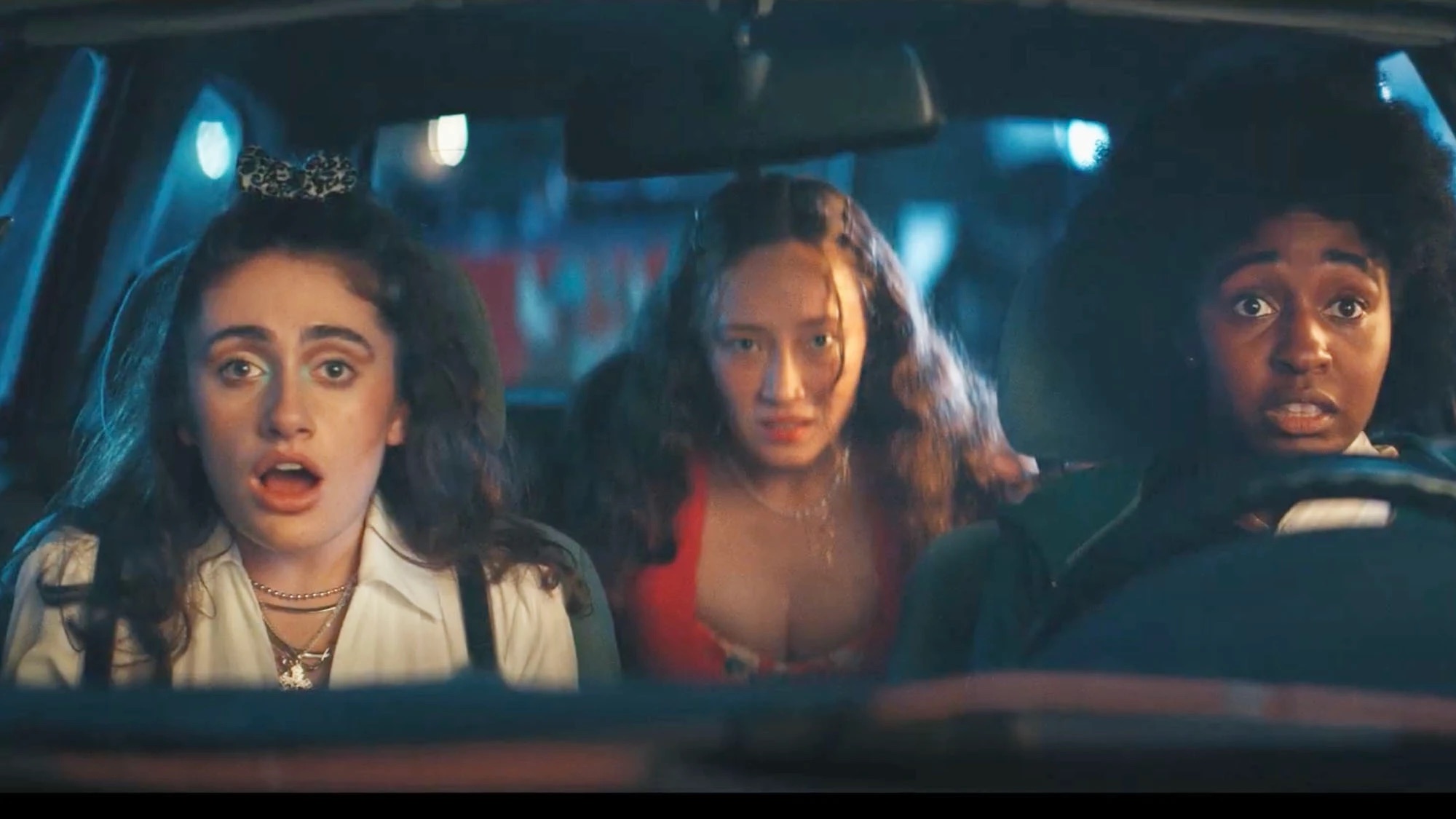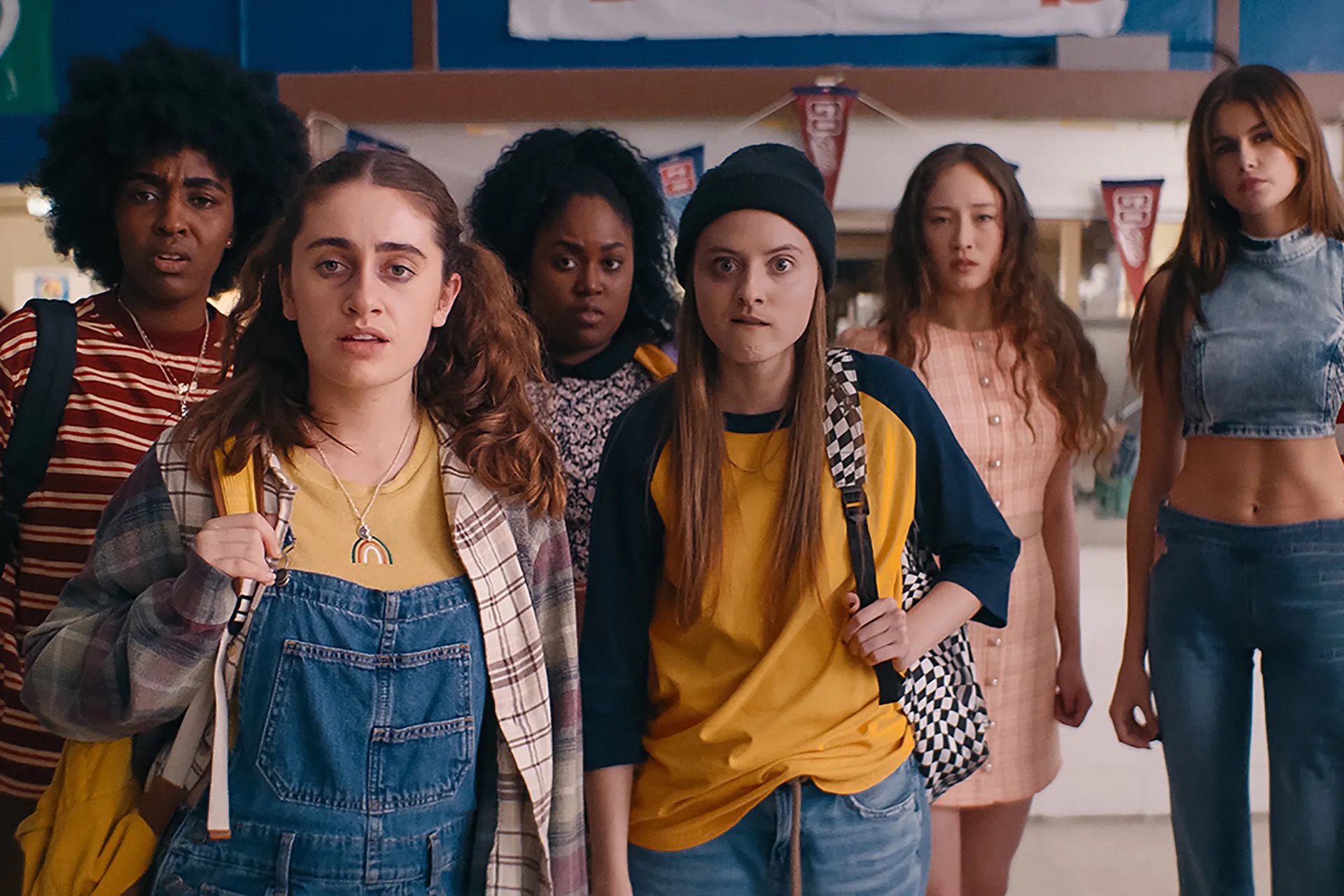
c/o Vice
The cat’s officially out of the bag: we’re all munching beaver here at Wesleyan. So we might as well talk about the film that broke the news. Actor Rachel Sennott and director Emma Seligman have teamed up for the second time to create an absurd and fast-paced comedy, “Bottoms.” This time, Sennott worked alongside Seligman both in front of and behind the camera, as she helped write the “Bottoms” script. Ayo Edebiri, from Hulu’s “The Bear,” and Sennott co-star as a pair of hopelessly awkward lesbians who are desperate to get some action before graduating high school, and go to extreme lengths to get into both literal and figurative contact with their respective crushes.
“Bottoms” is an enormous tonal departure from Seligman and Sennott’s previous film, “Shiva Baby,” a tense but funny tale about navigating family and romance at a Jewish funeral. In contrast, “Bottoms” has a parody-like take on the typical high-school romcom with barely a minute of seriousness. This is one of the film’s virtues and flaws, as the script disregards any and all semblance of realism at the drop of a hat in pursuit of the bit, but said pursuit also causes the story’s emotional stakes to be lowered significantly as a result. This lack of emotional development was “Bottoms’” biggest flaw in Liam’s opinion; there were no moments of bonding between PJ (Sennott) and Josie (Edebiri) which might make you want to see their friendship flourish or cause you to worry when you see them argue. In addition, there are vague references to a long history between the two, yet this is never elaborated on in the slightest, leaving their entire relationship feeling like a missed opportunity. However, this seems to be an intentional choice on Seligman’s part.
“We…wanted to satirize the way female friendship is often shoved down our throats onscreen with teen girls,” Seligman said during an interview with The New York Times.
While it is within her right to criticize, there was no attempt at real commentary on this subject or exploration of what female friendship actually looks like in Seligman’s eyes, and the result is that PJ and Josie’s relationship simply feels shallow.
Where “Bottoms” shines is in the world it creates and its individual characters. Rock Ridge High is a brilliant parody of a high school that takes everything stereotypical about American high schools to a ridiculous extreme. Football players wear their full uniforms to class, the principal treats the homecoming game as the second coming of Christ, and teachers are so unconcerned about their jobs that they will read porn magazines in class. This absurdity is shown both on the surface level, with major plot events in reaction to the literal abductions and assaults of students by the rival high school, and in the minute details, like the pin-up style posters of Nicholas Galitzine as the hunky and immature quarterback Jeff hung around the school. While the events occurring may not always make sense, the nonsensical world they take place in is cohesive enough for this to be forgotten.
Sennott dominates the film, commanding the screen with her overwhelming presence, even in light of her inability to have a shred of game. PJ’s real motives for starting the fight club are just barely covered up with a sort of obnoxious confidence that Sennott affects well. Despite this, Sennott still manages to make the character the kind of asshole you can’t help but want to root for.

c/o Orion Media
Edebiri’s comedic acting took a serious step up from her performance in “The Bear,” where her tone and delivery could often come off as cringey. In “Bottoms,” however, she’s a good comedic foil to Sennott’s brash demeanor with her hopeless negativity and moments of painful awkwardness. When she does venture into different brands of comedy, such as when Josie gives in to PJ’s pressure to play along with the idea the pair went to juvie, she has her own effective style of hilariously lying through her teeth.
Apart from Sennott’s exaggerated bravado and Edebiri’s comedic pessimism, Galitzine’s Jeff and Marshawn Lynch’s Mr. G are the largest comedic presences. From the start of the film, Galitzine is the epitome of a punchable face. He oozes unsubstantiated confidence, which is undermined by his often childish mannerisms as well as his teammates’ overprotectiveness, usually causing some decent laughs. Mr. G is PJ and Josie’s laid-back teacher, who agrees to sponsor the pair’s club as a move of feminist allyship. The outlandish ways in which Mr. G interprets supporting women and inserts himself into conversations make you fall in love with the character despite his flaws. Despite this being Lynch’s first prominent role in a feature film, his performance was stellar and I look forward to seeing him in more roles. Havana Rose Liu as Isabel also made for some great sleeper jokes. Even though she is presented as the naive beautiful girlfriend archetype, her surprising veneration of physical force made for one of the best lines of the film: “Acts of violence are my love language.”
While some punchlines may not have landed and you may not be too attached to the characters, the climax at the end of the movie wraps up the film so well that the problems are almost all excusable. The continuing escalation of a high school rivalry comes to its natural conclusion: The opposing team tries to kill a Rock Ridge player, and it’s up to PJ and Josie to stop them to save their reputations (and less importantly, someone’s life). The club is reunited after falling out and the lengths gone to divert the crowd’s attention as well as the sheer spectacle of the resulting battle between the fight club and the rival team’s players made me not want to miss a minute. The culmination of highly choreographed fights between the students, sweeping dramatic shots of the chaos, and the ending realization that these girls just killed almost the entire team topped any expectation I could have had for this film’s climax in the best possible way.
“Bottoms” reflects a dream of queer liberation movements of the past, yet sidesteps the pitfalls of the modern respectability politics focused on conforming. In its world, queerness is neither an obstacle nor assimilated. PJ and Josie are not sanitized to be “good representation;” they are raw and realistic in their imperfection. This film gives young queer people, especially queer women, an opportunity to laugh at themselves and not have to reckon with the often dreary reality of finding acceptance and companionship. Yes, “Bottoms” may not be a perfect film, but this is a queer movie that is funny as hell and takes risks and I think that more than justifies its existence.
Liam Dorrien can be reached at ldorrien@wesleyan.edu.
Nicole Lee can be reached at nlee@wesleyan.edu.
Comments are closed